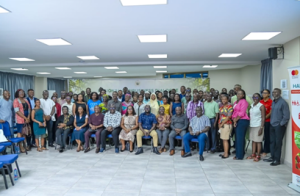
By Elizabeth PUNSU, Kumasi
The Chief Executive Officer of Agri-Impact Limited, Daniel Fahene Acquaye, has urged government to make bold and strategic investments in the agribusiness sector – saying this is critical to unlocking its full potential for economic transformation.
According to him, without decisive policy reforms and sustained capital injection, the country risks losing out on the immense opportunities that agriculture offers for job creation, industrialisation and export growth.

This, Mr. Acquaye believes, can be done with the creation of a national Agri-Fund to provide sustainable financing for agribusinesses and attract greater private sector participation.
“We have GETFund supporting education and other sectors, so why not an Agri-Fund to support agribusiness? If agriculture is to transform our economy, we must back it with consistent funding,” he stressed.
He pointed to government’s ‘Big Push Agenda’ – which channels royalties from oil and mining into strategic sectors – and called for agribusiness to receive similar priority under such national investment frameworks.
“We must be bold to invest, bold to reform outdated policies and bold to stay the course. Agribusiness deserves the same ‘big push’ we are seeing in other sectors,” he added.
He called on policymakers, financiers and industry players to collaborate in building a resilient, competitive and modern agribusiness ecosystem capable of driving inclusive growth and ensuring food security.
“We need leadership willing to take calculated risks for long-term gain. With the right investment and policy support, Ghana’s agribusiness can become the backbone of our industrial growth and a key player in the African food economy,” he said.
Mr. Acquaye – who was speaking at the Ashanti Region edition of the Regional Agribusiness Dialoguein partnership with the Ministry of Trade Agribusiness and industry, supported by the Mastercard Foundation – made a strong case for policy and investment resets which align with current market realities and emerging trends.
“Agribusiness holds the key to transforming Ghana’s economy, but we’re still importing US$2billion worth of food annually while losing US$1.9billion post-harvest. This is not sustainable,” he said.
Using the Ashanti Region as a case study, Mr. Acquaye illustrated economic inefficiencies in the sector. He revealed that the region consumes food and non-alcoholic beverages worth over GH?14billion (approx. US$1.2billion) annually, yet the country’s post-harvest losses exceed this figure.
“We are literally losing food that could feed an entire region for over a year and a half. Yet we continue to showcase infographics of these losses at every conference instead of solving the problem,” he lamented.
The CEO further highlighted a geographic imbalance in agro-processing infrastructure, stating that although the northern regions account for 60% of the country’s land surface and are key production zones they remain the least industrialised.
Bridging academia and industry
Mr. Acquaye also called for tighter alignment between academia and industry, urging universities to ensure that student research and project work are tailored to solve real business problems.
“We cannot continue to produce graduates whose skills are mismatched with industry needs,” he said.
For his part, Director for Agribusiness-Ministry of Trade, Agribusiness and Industry Kwame Oppong Ntim said government is implementing a two-pronged strategy to boost agro-industrialisation and strengthen the agribusiness value chain.
He disclosed that in the short-term, government plans to waive taxes on agro-processing machinery to reduce costs and encourage investment in the sector.
“This will increase access to modern technology for agro-processors, enhance productivity and efficiency and stimulate growth and development in the agribusiness sector,” he explained.
In the medium- to long-term, Mr. Ntim said – through support from the International Fund for Agricultural Development (IFAD) under the Rural Enterprise Programme – government is partnering with the GRATIS Foundation to retool and strengthen local machinery manufacturing.
“The goal is to provide a strong base for local production of agro-processing equipment for small and medium enterprises, ensuring that Ghana can sustain its own industrial growth,” he noted.
The post Bold investments needed to transform agribusiness – Agri-Impact CEO appeared first on The Business & Financial Times.
Read Full Story

















Facebook
Twitter
Pinterest
Instagram
Google+
YouTube
LinkedIn
RSS